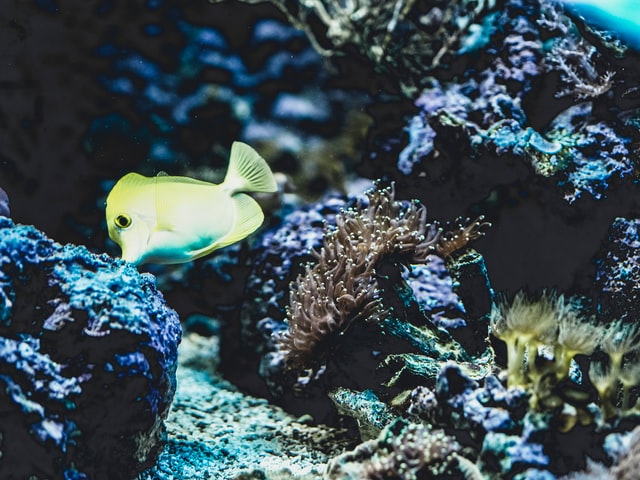Table of Contents
Drowning is defined as the physiological process of suffocating due to submersion in water or another liquid.
The myth of fish drowning states that fish can “drown” if they are placed in an environment with too little oxygen and they are unable to escape.
Do Fish Drown?
Fish have physical adaptations that help them survive in low oxygen environments. Fish have a unique organ called the swim bladder, which helps them to adjust their buoyancy in the water.
Fish also have special survival instincts that help them survive. They will often move to different areas of the water where there is more oxygen if their current environment is becoming too low in oxygen.
What organs do fish use to breathe
Fish breathe using their gills, which allow them to absorb oxygen from the water.
They have a unique organ called the swim bladder, which helps them to adjust their buoyancy in the water.
The swim bladder fills with air as the fish swims, regulating its depth in the water. On the other hand, some fish have developed the ability to breathe air from the surface and are able to survive in oxygen-depleted waters.
Fish can absorb oxygen from the water through their gills. The gills contain a series of filaments with tiny blood vessels that take in the oxygen from the water and send it to the fish’s bloodstream, where it is then transported around the body.
The gills also help the fish to expel carbon dioxide and other waste products, which helps them maintain their buoyancy and balance.
How Do Fish Breathe
Fish use their gills to take in oxygen from the water around them in order to survive. This process works by using a small flap of skin called an operculum, which allows water to flow in and out of the mouth.
When the pressure in the mouth is lowered, the water flows in and when the pressure is raised, it is pushed out.
This water passes over the gills, which contain filaments that draw dissolved oxygen into the fish’s bloodstream via a process known as countercurrent exchange.
The large surface area of the gills means that the fish can absorb more oxygen from the water, but if they are unable to do so then they can drown.
Causes of Death in Fish
Lack of Oxygen: If a fish is exposed to an environment with too little oxygen, they may die due to lack of oxygen.
Disease: Another possible cause of death in fish is disease. Some diseases can spread quickly in congested environments and can be fatal.
Predators: Finally, fish are also vulnerable to predators. Predators can catch and eat fish, which may lead to the death of the fish.
What causes a fish tank to have low oxygen levels?
Low water oxygen levels can occur for a variety of reasons, the most prevalent of which are:
- Overcrowding
- Actual plants (especially in cloudy dark tanks)
- Low levels of light
- Surplus waste
- The water is extremely hot.
- Chemicals
Fish can “drown” for a variety of reasons, not just because of low oxygen levels in the water. The fish’s ability to breathe may be hampered by illnesses or wounds to the gills.
Fish must also have healthy gills in order to breathe properly, just like humans and other mammals do. Fish that have damaged gills are more likely to suffocate; such damage may be the result of chemical or predatory animal attacks.
How Can You Tell If There Is A Low Oxygen Level?
Fish that live in low-oxygen environments may exhibit the following signs:
- Less eating while swimming
- Lingering longer on the surface and grabbing at labored breathing
- The gills moving quickly
A common problem that has impacted some of the above is having too many fish in the aquarium. In order to solve the problem, overcrowding must be reduced; otherwise, the change you’re making will only offer a short-term solution.
Reasons For Low Oxygen Levels In The Water
Start by addressing the most prevalent problem, overcrowded aquariums, in order to combat the various causes of low oxygen levels.
-
Keep the appropriate number of fish.
The oxygen levels in your aquarium are affected by each fish you add. Study your fish species and the maximum number per gallon.
Before you begin adding fish to your tank, make sure to properly cycle by aiming lower than that number, leaning toward the leaner side.
-
Preserving adequate oxygen
Another crucial element in keeping your aquarium properly oxygenated is to make sure there is enough room for gas exchange that occurs on the water’s surface. Use longer shapes like traditional rectangles or bow shapes rather than small or tall aquariums.
-
Exetreme water promotion
For the aquarium’s water to move, spend money on additional spray bars, aquarium bubbles, powerheads, or wavemakers.
To avoid exceeding the recommended flow of water for your particular species, be sure to read the requirements. To keep your fish healthy and happy, make sure to keep your aquarium clean.
-
Maintain the aquarium at the proper temperature.
Maintain the proper temperature in your aquarium, and you’re done. Naturally, there is a lot of oxygen in cold water.
Choose the lower end of the temperature range for your fish and be sure to shield the sun from your aquarium.
-
Biological Reasons for Low Oxygen Levels
Fish have been known to suffocate due to low oxygen levels in the environment, though these incidents are extremely rare.
Algal blooms can reduce the amount of oxygen that is readily available. Aquatic life suffers as a result of the dissolved oxygen being consumed by algae during their decomposition and death.
Plants that are rotting and dying while submerged can also lower the concentration of dissolved oxygen. Called Carbonaceous Biochemical Oxygen Demand, the decay process (CBOD).
Conclusion
So that’s it. Fish cannot actually drown, but they can suffocate in conditions of low oxygen levels or when they are unable to properly absorb oxygen from the water, but not due to inhalation or submersion in water, so they do not drown.
People probably have this misconception for the same reason that they believe a fish cannot breathe; since they know a person can drown in water, they extrapolate that the same thing must happen to a fish if it is unable to breathe underwater.
Both instances involve a respiratory system. Designed for use in air or water, Lungs and Gills perform better in their natural habitat than in any other habitat.
When you look at the word “drown,” you can see that fish do not suffer and die from water inhalation. Fish may experience a similar experience when they leave the water or oxygen, even though they may not actually drown.







